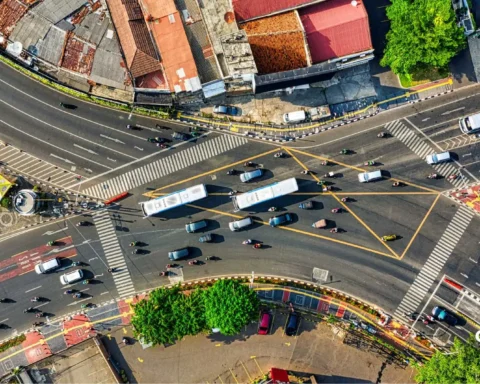No amount of wishing for a ‘better Earth’ will bring about the necessary change. It needs mindful analysis and hardcore action to achieve the same. In this article, we get into the nitty-gritty of the policies and actions taken by the Slovenian government and other relevant world organisations toward sustainable forest management.
Slovenia’s wood processing industry is a strategic raw material with promising prospects, playing a significant role in the country’s economy before independence. The industry focuses on enhancing the entire forest and woodworking chain.
Listen To This Podcast: Is Slovenia the Emerging Logistics Goldmine in 2024? Insights from Natasa Pogacnik
Table of Contents
Forest Policy for Sustainable Forest Management
The Resolution on the National Forest Programme is a strategic document establishing national policy for sustainable forest management. It aims to protect forests and ensure their multipurpose role in social, economic, and environmental spheres. Forestry aims to preserve the natural environment, maintain ecological balance, and ensure sustainable development considering biodiversity. Forest owners are required to maintain forest functions, adhering to silviculture and forest management plans.
Slovenia’s wood industry is gaining importance due to rising fuel prices and climate change concerns. The Wood Industry Directorate and SPIRIT Slovenija agency have promoted the use of Slovenian wood, particularly in the construction sector, where it can be used in large quantities for extended periods.
Target Research Programme on Agriculture, Forestry, and Food
Slovenia has launched a Target Research Programme on Agriculture, Forestry, and Food for 2022-2027, aiming to promote research and innovation in these sectors. The program focuses on sustainability, competitiveness, and societal well-being, aiming to enhance food quality, biodiversity conservation, and support rural development. Priority areas include sustainable agriculture, forestry management, food safety, circular bio-economy, biodiversity conservation, and rural development.
The Slovenian government, the European Union, and other sources fund a program that is implemented through research proposals, industry partnerships, and international collaboration. For the latest information, consult official sources like the Ministry of Agriculture, Forestry and Food or the Slovenian Research Agency.
The overall strategy works in cohesion. The programs on agriculture, forest, and food are aligned with the policies in other sectors. These are in the industrial and rural development fields. Thus, a bird’s eye view of the ecosystem analysis transitions to effective policies and implementations.
Read This Article On: Slovenian Wood Industry: The Forest Story
Operational Programme for the Implementation of the European Cohesion Policy (OPINFO 2022–2026)
The Operational Programme for the Implementation of the European Cohesion Policy in Slovenia (OPINFO) is a strategic document that outlines priorities, objectives, and actions for the use of European Union funds in Slovenia. It is prepared by the Ministry of Economic Development and Technology in collaboration with other ministries, government agencies, and stakeholders. The OPINFO guides EU-funded projects and programs, contributing to Slovenia’s socio-economic progress and sustainable growth.
The priorities outlined in the Operational Information (OPINFO 2022–2026) document or strategy for forest and game management are as follows:
- Making sure forests absorb CO2 and adjust to climate change, especially to keep them resilient, stable, vibrant, and healthy.
- Monitoring the resilience, stability, vitality, and health of forests, as well as preserving and enhancing their biodiversity at the landscape, ecosystem, species, and genetic levels.
- Improving the legal, administrative, and financial guidance of game and forest management to safeguard forests’ multipurpose role, support rural development, and bolster the circular bio-economy.
- Encouraging collaboration and communication amongst all parties involved in the management of forestry, game, and forests; expanding research, knowledge transfer, and education; and bolstering global cooperation.
- Ensuring long-term game administration.
These priorities reflect a comprehensive approach to forest and game management, encompassing climate change adaptation, biodiversity conservation, stakeholder engagement, sustainable resource utilisation, and international cooperation.
Natura 2000 Program
The Natura 2000 network in Slovenia covers 6% of the country’s territory, housing 128,000 residents. It includes 70% forest and 20% built-up spaces, preserving biodiversity and protecting natural habitats and species, playing a crucial role in Slovenia’s conservation efforts.
Natura 2000 in Slovenia is a program aimed at protecting and conserving biodiversity by identifying and managing ecologically significant areas. Its main objectives include habitat and species conservation, management program implementation, recognition and awards, and biodiversity projects. Since 2004, over 90 projects have been executed to contribute to biodiversity conservation in Slovenia. Europe is recognised for its biodiverse and sustainable practices, with a significant portion of its territory included in the Natura 2000 conservation system.
Forest-Wood Chain in Slovenia by 2030
Slovenia is promoting sustainable forest resource management through the “Action Plan for Increasing Competitiveness of the Forest-Wood Chain in Slovenia by 2030,” with the slogan “Wood is beautiful”, highlighting its commitment to sustainable use.
The plan emphasises sustainable forest management for Slovenia’s long-term forest health and productivity, promoting biodiversity, ecosystem protection, and climate change resilience. It also aims to develop a competitive wood processing industry, supporting research, promoting advanced technologies, and producing high-value wood products, thereby enhancing the country’s competitiveness.
The action plan focuses on the circular bio-economy, promoting sustainable wood resource use, waste reduction, and bio-based products. It optimises resource use and integrates wood products into circular economy models. The plan also emphasises human capital development in the forest-wood chain, enhancing education and training programs, vocational skills development, and knowledge transfer.
Read This Article On: Slovenia’s Wood Industry: Climate Change Mitigation
Role of the Food and Agriculture Organization (FAO)
The Food and Agriculture Organization (FAO) is a key player in global forestry management, providing technical expertise and guidance to help countries develop and implement sustainable policies. It also facilitates the collection and analysis of forest-related data, such as forest inventories, deforestation rates, and health assessments, which is crucial for evidence-based decision-making and monitoring of forest resources.
Role of the Forest Stewardship Council (FSC)
The Forest Stewardship Council (FSC) is an independent organisation that certifies forests for sustainable management and promotes responsible forestry practices globally. The Forest Stewardship Council (FSC) plays a significant role in Slovenia by certifying responsibly managed forests, distributing ownership and management responsibilities, and contributing to the development of forest stewardship standards.
Government Blueprint
The Slovenian Forest Monitoring and Ecosystems (LSMFFE) conducted in 2000, 2007, 2012, and 2018 provides insights into the status and changes of Slovenian forests. The methodology for calculating means is detailed, and the data is used for international and national reporting on the sustainable development of Slovenian forests.
The Slovenian forest inventory system uses an internationally harmonised methodology on a systematic grid of plots. In 2020, it was upgraded to a continuous panel system based on new permanent sample plots. The system is used for annual preparation of the 10-year Forest Management Plans (FMP), Forest Management Units (FMU) and biennial (Ministry of the Environment and Spatial Planning (HMZPs), as well as 10-year preparation for the FMP, Forest Management Areas (FMA) and long-term HMZPs.
Slovenia is divided into 14 Forest Management Regions, and the allocation of FMAs within these regions is pivotal for ensuring effective and sustainable forest management practices. This allocation strategy plays a crucial role in preserving Slovenia’s forests and maintaining ecological balance.
The Slovenia Forest Service (SFS) Report provides annual data on forests and game, including the state of the forest and game, monitoring of planned works, expert opinions, project conditions, consents for activities, forest traffic routes, forest-damaging factors, recovery plans, and measures for wildlife habitat maintenance.
Slovenia’s government prioritises sustainable forest management, biodiversity conservation, and certification schemes such as FSC and Programme for the Endorsement of Forest Certification (PEFC) to ensure ecological, social, and economic objectives. They also support research and innovation to enhance the competitiveness and marketability of Slovenian wood products.
The government is involving local communities, forest owners, and stakeholders in decision-making for forest management, ensuring stakeholder interests are considered. Measures include fire management plans, infrastructure investment, and public awareness campaigns.
Strategies for Strengthening Forest Resilience
Wildlife is an integral part of forests. Slovenia recognises this symbiotic relationship and its effect on the health of both. The wildlife management policy focuses on protecting endangered species and preserving natural ecosystems. The government, through decrees like the “Decree on Protected Animal Wild Species,” actively safeguards these species through its comprehensive approach. Slovenia addresses nature conservation challenges through policies integrating wildlife management with biodiversity, ecology, environment, and natural resource management, using Close to Nature Forestry principles for holistic forest management.
Read This Article On: Slovenian Wood Industry: Sustainable Business Prospects
Institutional Support
Some of the institutional support is from the Slovenian Forestry Institute, the National Institute of Chemistry, the Furniture and Wood Processing Association, the Wood Industry Cluster, the SRIP Smart Buildings and Home, and the Living Lab InnoRenew CoE.
Private Businesses
The majority of the forests are owned by the private sector. There are several players in the wood business. Some of them are Adles (massive glued panels), Merkscha (cutting veneer mill), Marles hiše Maribor (prefabricated nearly zero-energy buildings), Akron (made-to-measure furniture), Inles (windows, front doors), and LIP Bohinj (formwork panels).
You Might Be Interested In: Slovenian Economic Recovery: Post-COVID Challenges and Reforms
Conclusion
Forests are an important economic factor, providing energy and green jobs. Slovenia’s forests are a symbol of the country’s recognisability and reflect its attitude towards sustainable development. They contribute to the protection of soil, waters, and climate and provide habitats for plant and animal species. They also serve as a place for relaxation and recreation for people.
Slovenia has a long-standing tradition of sustainable forest management, and the country places great emphasis on the conservation and responsible use of its forest resources. The sustainable management of forest cover in Slovenia is guided by a comprehensive set of policies, practices, and initiatives aimed at balancing environmental, economic, and social objectives.
Nothing short of a full-fledged comprehensive approach will aid in involving all stakeholders, including nature, considered as a sentient being, will work.










[…] Read This Article On: Slovenian Wood Industry: Sustainable Forest Management […]
[…] Read This Article On: Slovenian Wood Industry: Sustainable Forest Management […]
[…] has seen a surge in eco-tourism companies that prioritise sustainable practices and contribute positively to local communities. Here are a few notable […]
[…] Mobility: Slovenian cities are promoting cleaner air and reduced traffic noise through soft mobility initiatives like […]
[…] collaborative conservation efforts and addresses human-wildlife conflict, habitat degradation, and sustainable resource management […]
[…] the future. Therefore, it becomes essential to think about waste management if one wants to make a sustainable world that does not reek of smoke or stink of discarded materials. All this can be possible when […]